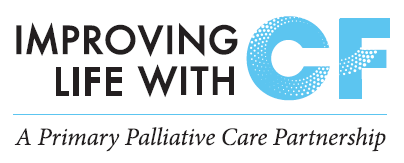Patient and Family Caregiver Educational Handouts
- Even as scientific advancements are leading to new CF therapies, many aspects of well-being for people with CF and their families require attention. You can now access a new series of educational handouts created especially for people living with CF and their loved ones through Improving Life with CF: A Primary Palliative Care Partnership.
- These handouts address symptoms commonly experienced by those with CF, such as pain, changing energy levels, poor appetite, stress, and breathing problems like cough and shortness of breath. Each handout provides information on the common causes of specific symptoms, how to communicate with healthcare providers, techniques for self-management and medical management, and patient and family resources. Other handouts provide education on general topics, such as discussing health care choices with your CF care team.

Palliative Care in CF
Palliative Care in CF
This handout explains what palliative care is, who typically provides this type of care, and how palliative care may help to reduce symptoms and stress for those with CF.
Common Physical Symptoms
Each of the handouts below discusses common physical symptoms among individuals with CF.
Gastrointestinal Symptoms
Many people with CF experience gastrointestinal (GI) problems that can affect their quality of life. This handout reviews possible causes and management options for abdominal pain, diarrhea, and constipation.
Appetite and Nausea Symptoms
This handout provides information on poor appetite, nausea, vomiting, and weight loss, as well as actions that can be taken to help improve these conditions.
Dyspnea (Shortness of Breath)
Dyspnea, or difficulty breathing, may be associated with chest tightness, cough, or wheezing. This handout reviews possible causes of dyspnea and cough, and provides self-management techniques that people with CF can use to recover from a breathlessness episode.
Fatigue
Persistent fatigue that does not improve with rest is a frequent problem for many people with CF. This handout describes different types of fatigue that are common with CF and a variety of self-management strategies to manage it, including physical activity, activity pacing, improving sleep, and relaxation.
Pain
This handout reviews how CF can lead to acute or chronic pain, potential problems caused by pain, effective treatment approaches, and strategies for self-assessment and management, including a self-assessment guide and relaxation techniques.
Emotional Stress
The handouts below focus on unique sources of stress that may be experienced among individuals with CF and their caregivers.
Pediatric Patients and their Caregivers
Everyone experiences stress at some points in time. However, young people living with CF and their families can experience unique sources of stress. This handout can assist parents and caregivers with understanding and managing common stressors for their children as well as themselves.
Adult Patients and their Caregivers
Adults living with CF, as well as their spouses, partners, or caregivers, can face challenging circumstances and demands. This handout reviews some common sources of stress related to CF, signs of stress, and techniques to self-manage stress.
Health Care Decision-Making
The handouts below focus on making decisions regarding health care.
Advance Directives
While no one likes to think about being so sick that making your own decisions becomes challenging or impossible, people with a serious illness may find themselves in this situation, and it is good to be prepared. This handout provides important information on making your advance directives, including recording treatment preferences and choosing a health care agent.
Discussing Health Care Choices
This handout provides insight into how you can partner with your CF team and support system to make decisions about your health care.






